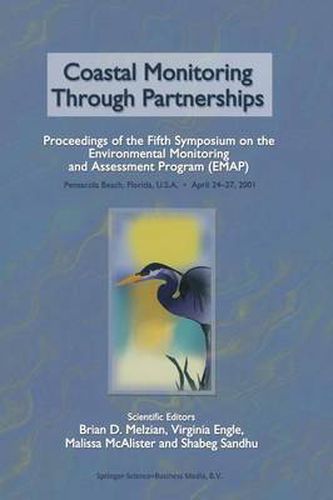Readings Newsletter
Become a Readings Member to make your shopping experience even easier.
Sign in or sign up for free!
You’re not far away from qualifying for FREE standard shipping within Australia
You’ve qualified for FREE standard shipping within Australia
The cart is loading…






This title is printed to order. This book may have been self-published. If so, we cannot guarantee the quality of the content. In the main most books will have gone through the editing process however some may not. We therefore suggest that you be aware of this before ordering this book. If in doubt check either the author or publisher’s details as we are unable to accept any returns unless they are faulty. Please contact us if you have any questions.
As the coastal human population increases in the United States, there will likely be increasing environmental and socioeconomic pressures on our coastal and estuarine environments. Monitoring the condition of all our nation’s coastal and estuarine ecosystems over the long term is more than any one program can accomplish on its own. Therefore, it is crucial that monitoring programs at all levels (local, state, and federal) cooperate in the collection, sharing, and use of environmental data.
This volume is the proceedings of the Coastal Monitoring Through Partnerships symposium that was held in Pensacola, Florida in April of 2001, and was organized by the U.S. Environmental Protection Agency’s (EPA’s) Environmental Monitoring and Assessment Program (EMAP), and the Council of State Governments (CSG). It contains papers that describe various multi-disciplinary coastal and estuarine environmental monitoring programs, designed and implemented by using regional and national partnerships with federal and state agencies, academia, Native American tribes, and nongovernmental organizations. In addition, it includes papers on modeling and data management; monitoring and assessment of benthic communities; development of biological indicators and interlaboratory sediment comparisons; microbiological modeling and indicators; and monitoring and assessment of phytoplankton and submerged aquatic vegetation.
There are many components involved in determining the overall impacts of anthropogenic stressors on coastal and estuarine waters. It will take strong partnerships like those described in this volume to ensure that we have healthy and sustainable coastal and estuarine environments, now and in the future.
$9.00 standard shipping within Australia
FREE standard shipping within Australia for orders over $100.00
Express & International shipping calculated at checkout
This title is printed to order. This book may have been self-published. If so, we cannot guarantee the quality of the content. In the main most books will have gone through the editing process however some may not. We therefore suggest that you be aware of this before ordering this book. If in doubt check either the author or publisher’s details as we are unable to accept any returns unless they are faulty. Please contact us if you have any questions.
As the coastal human population increases in the United States, there will likely be increasing environmental and socioeconomic pressures on our coastal and estuarine environments. Monitoring the condition of all our nation’s coastal and estuarine ecosystems over the long term is more than any one program can accomplish on its own. Therefore, it is crucial that monitoring programs at all levels (local, state, and federal) cooperate in the collection, sharing, and use of environmental data.
This volume is the proceedings of the Coastal Monitoring Through Partnerships symposium that was held in Pensacola, Florida in April of 2001, and was organized by the U.S. Environmental Protection Agency’s (EPA’s) Environmental Monitoring and Assessment Program (EMAP), and the Council of State Governments (CSG). It contains papers that describe various multi-disciplinary coastal and estuarine environmental monitoring programs, designed and implemented by using regional and national partnerships with federal and state agencies, academia, Native American tribes, and nongovernmental organizations. In addition, it includes papers on modeling and data management; monitoring and assessment of benthic communities; development of biological indicators and interlaboratory sediment comparisons; microbiological modeling and indicators; and monitoring and assessment of phytoplankton and submerged aquatic vegetation.
There are many components involved in determining the overall impacts of anthropogenic stressors on coastal and estuarine waters. It will take strong partnerships like those described in this volume to ensure that we have healthy and sustainable coastal and estuarine environments, now and in the future.